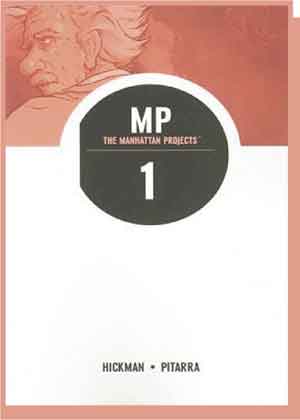"Eternals" and "The Manhattan Projects"
by Carolyn Marcille

By Neil Gaiman (Author), John Romita Jr. (Illustrator) Marvel Comics (Publisher)
Jack Kirby is one of the men intimately responsible for shaping the world of comics that we know today. Kirby had his hand in everything, from Captain America to the Fantastic Four, to the Hulk, Thor and Iron Man—you name it. Kirby is a legend that created legends. Introduced in 1976 by Kirby, the Eternals were an exploration of gods among humanity. Envisioned as a superior race of immortal beings, the Eternals were created by the Celestials, gods closely resembling the ancient Greek figures we know already on Earth. The Celestials’ meddling with proto-human DNA created another group—the Deviants, a race of powerful (but not immortal) beings that are destined to be at odds with the Eternals due to their evil and unstable natures. If all of this sounds a little heavy, it is. Kirby was referred to as “the William Blake of comics,” which honestly seems to account for a lot of the prophecy and mystical symbolism contained within his creations. Blake was deeply concerned with the development of good and evil within the human spirit, and Eternals follows this arc in a terrifying and bombastic way with the awakening of a Celestial who will ultimately judge the fate of Earth. The mantle of Eternals was passed to Neil Gaiman for this volume and, based on the metaphysical themes that inform Kirby’s original characters, I can think of no one better than Gaiman to discuss the ways in which a race of gods may interact with humanity. Gaiman’s history with characters that deal with endless lives and impossible choices allows Eternals to develop in a meaningful and intelligent way, filled with pathos and soul-searching storylines.

By Jonathan Hickman (Author), Nick Pitarra (Illustrator) Image Comics (Publisher)
The concept of a social contract is typically dated during the Age of Enlightenment, but it isn’t too far of a stretch to say that any of the theorists who attempted to explicate why an individual would voluntarily give up “natural freedoms” in order to obtain the benefits of political order never could have considered the advent of nuclear warfare. Citizens in this postmodern world have been the recipients of a much different deal than those living in prior centuries, and it must be acknowledged that things in our present universe have gotten, well, weird, often as a direct result of decisions made by people we have never met making decisions about us based on what they believe is in our best interest. Since our reality is so deeply tied to such an uncanny concept, the alternative reality presented by The Manhattan Projects doesn’t seem so strange. The text holds a basis in reality; during World War II, the J. Robert Oppenheimer-led Manhattan Project was responsible for the creation of nuclear weapons. In Hickman’s timeline, Oppenheimer is still in charge, but has an evil twin. Albert Einstein, Richard Feynman and Enrico Fermi are also present, but as vastly different, sometimes literally alien versions of themselves. Colors and illustrations are kept simple in order to paradoxically illuminate the ever-increasing lunacy of the situation. This is alternate universe writing at its gonzo best; honestly, if Einstein had been a barbarian from another dimension, how would we ever know? We are “protected” from such knowledge by the social contract, but it isn’t so difficult to imagine that those in power would go to unimaginable lengths to see their desires fulfilled. Hickman’s addictive, fevered story is clinical social commentary wrapped keenly in the grotesque.
blog comments powered by Disqus|
Issue Navigation> Issue Index > v14n36 (Week of Thursday, September 10) > "Eternals" and "The Manhattan Projects" This Week's Issue • Artvoice Daily • Artvoice TV • Events Calendar • Classifieds |









 Current Issue
Current Issue